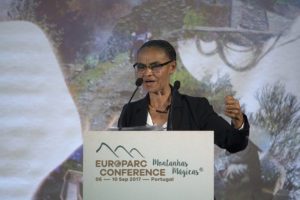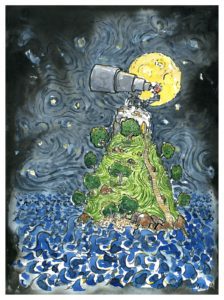An ideal for change by Marina Silva
Marina Silva is one of the invited contributors of the Protected Areas In-Sight 2017. Marina was Minister of Environment in Brazil between 2003-2008 and is currently running for President. During her mandate, 25 million hectares of new National Parks were created and over 12 million young people were involved in environmental actions all over the country. Follow Marina Silva on Facebook.
An ideal for change
article issued by Marina Silva

Marina Silva, environmental activist and member of the Brazilian Parliament was a keynote speaker at EUROPARC Conference 2017, Arouca, Magic Mountains, Portugal © Eduardo Realinho
A political crisis is visible around the world .The “owners of the world”, including authoritarian and/or populist leaders, seem more dedicated to profit from the crisis, instead of solving it. Big countries’ societies look for ways out but they seem to be stuck on how to change, remaining vulnerable to conscience numbness. Disorientation dominates.
This is just the most visible and noticed aspect of the situation, the tip of the iceberg. In reality, the crisis is much bigger and not restricted to conflicts of political and social nature, nor to the financial breakage that sweeps national economies in all continents, throwing billions of people into unemployment. The fast evolution of global warming and its terrible effects on the planet is extremely serious.
On the background of the political and social conflicts, there is a value crisis– a loss of meaning and a weakening of human solidarity.
Those crisis (political, social, economic, environmental and of values) are simultaneous because they are systemic. They form what I call civilization crisis. It is the human civilization who is at stake. For the first time in history, we need to face the possibility of an imminent interruption of conditions that allow life in this planet.
When success means failure
How did we come to this extreme condition? Paradoxically, it was not by failure, scarcity or weakness, but rather by our successes, by the excess and by the strength we impose on this planet. We obtained success with our technologies – on food production, disease treatment, recycling and waste management and, above all, in generating and using energy efficiently.
With these technologies, we grew abruptly: currently 7 billion with perspective of reaching 9 billion in 2050. We repeated the success formula and obtained more excess. We broadened the system that we started about 450 years with the arising of mercantilism, with its production and consumption model that does not account for the support capacity of ecosystems. Meanwhile, we are contaminating the atmosphere with gases causing temperature rise, destroying forests, landscapes, biodiversity, fertile soil and hydric resources at an unimaginable scale.
Yet more, the ultimate consequences is the change on human mentality and on the identity ideals that used to reference human endeavours.
In four centuries, the ideal of being was replaced by the ideal of having. Consumption started to be a symbol of success and achievement.
To have, or not to have?
We do not want to be immortal, as the Egyptian desired, nor wise and free, as the Greek wanted, or neither great and strong, as the Romans praised. We do not want to be saints or knights, as the medieval Europeans wanted. Now, we want to have, and to own things.
The meaning has inverted: before, being virtuous opened the possibility of earning valuable things; now, having valuable things may give us the means to be respectable, admirable and virtuous people.
We can “be” infinite things without exhausting the planet. However, in order to “have” more, we collide with natural boundaries. In four centuries, we crossed those boundaries and won our struggle against nature restrictions… And by doing that, we destroyed the source of life. We walk towards collapse.
How to overcome the civilization crisis?
I believe this is only possible if, within the crisis system, a significant amount of people unleash an identity-breaking pressure from the current system. World change will not come by a prolonged and reasonable planned transition, nor by a quick, abrupt and violent rupture. The old dilemma “reform vs. revolution” has expired.
Change can come from a type of alternative enabling mutation. It shall change mentalities, values, meanings, and ideals. And then, it will also change the way we produce, consume, and relate to each other and to other forms of life.
There will be no place in the world for excessive consumption. The planet cannot supply our infinite desire of having things, but our planet is the best environment there is for us to exercise our infinite wish for being. Of being the best artists, poets, writers, cooks, educators, physicians, people.
It is necessary to add to the great ideals of the French Revolution of equality, freedom and fraternity, the ethical imperative of sustainability.
